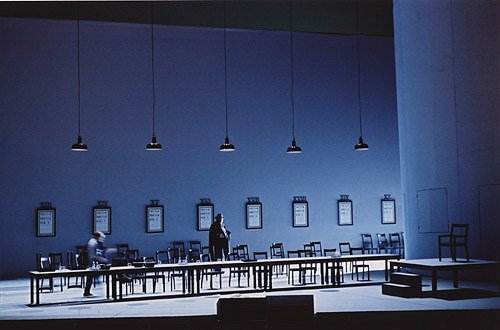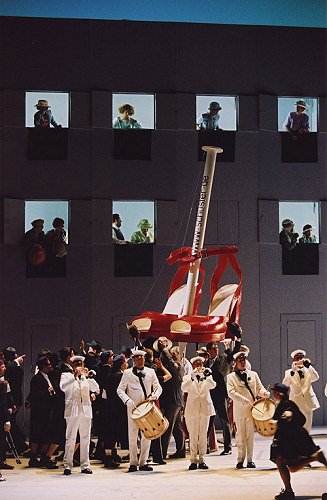| Error processing SSI file |
||||
|
Editor: Marc Bridle
Webmaster: Len Mullenger
|
Wagner:
Die Meistersinger von Nürnberg,
Bavarian State Opera, Munich, 2nd
July, 2004 (SM)
Originally conceived as a comedy and premiered in Munich in 1868, Meistersinger very quickly became a celebration of German nationalism, staged at prestigious occasions, such as imperial visits or other days of special national significance.
Some directors
choose to simply gloss over the words, as
if embarrassed by them, hoping no one will
notice. Others, such as Christof Nel in his
recent Frankfurt production, are not afraid
to peer into the abyss and place the ideologically
tainted reception of the opera at the very
centre of their interpretation, turning Sixtus
Beckmesser into a Jew and the riot that ends
Act II into some sort of Kristallnacht
pogrom. Thomas Langhoff is not quite so confrontational in his new production that opened Munich's month-long summer opera festival. But perhaps it is precisely that that was the problem. The skinhead-like thugs are still there, complete with bomber jackets and baseball bats, looming threateningly at the end of the Act III. (Interestingly, Langhoff has the thugs scrapping among themselves, rather than beating up Beckmesser, at the end of Act II.)
In addition, the lighting is dimmed rather than turned up for the closing C-major chord of the Festwiese, underlining the threatening, ambivalent atmosphere. Langhoff was roundly booed when he took his curtain call at the end of the first night. But that may have more because his modern-dress reading lacked any real bite than because it was particularly controversial. Perhaps the director felt intimidated because he was staging the work in the city of its birth, which boasts an unprecedented Meistersinger tradition.
Expectations may have also been running unfairly high, because his production was to replace August Everding's popular, but rather anodyne staging that was finally put to bed after a run of 24 years last year. Not that Langhoff's production doesn't have some cheeky eye-wink touches. His up-dating equips Beckmesser with a lap-top computer on which he catalogues Stolzing's singing errors in Act I. Nuremberg's youth run around in baseball caps, hippily worn backwards, and T-shirts emblazoned with the letter "Nürnberger Poesie e.V" (or "Nuremberg Poetry Club"). When Beckmesser serenades the woman in the window he believes to be Eva, he uses a ghetto-blaster rather than a lute. The nightwatchman in Act II is a homeless tramp, pushing a shopping trolley bulging with plastic bags. In the final Festwiese scene, when some of the Meistersinger arrive with their wives on their arm, Kunz Vogelsang brings his male partner. And the singing contest itself is covered by an on-stage camera team.
Admittedly, such touches may not be to everybody's taste. But graver directorial sins have been committed, worse travesties done to a composer's work in the history of modern Regietheater. To be fair, some of the blame for the longueurs of Munich's new Meistersinger must be shouldered by the Staatsoper's Generalmusikdirektor Zubin Mehta.
In the programme book, Mehta talks about how Mozartian he feels the opera is compared with Wagner's other works. Unfortunately, there was little lightness in Mehta's frequently leaden and stodgy conducting. Not until Act III, which contains surely some of Wagner's most wonderous music, did he show any signs of coming to life.
And that, in turn, helped Langhoff's direction, too. Although the credit, here, must still largely go to Wagner, whose fantastically detailed score so wonderfully portrays every tiny detail, even Beckmesser's discovery and theft of the piece of paper on which Sachs notated Stolzing's song. It wasn't until Act III that the exemplary Staatsoper orchestra could really show what a superb ensemble it is.
As for the singers, the Munich cast was mostly good. Michaela Kaune's Eva started shyly, and while her soprano gained in warmth and timbre as the evening progressed, she was still not wholly convincing in the part. Katharina Kammerloher was an agile and elegant Magdalene and Kevin Conners a warm and expressive David. Matti Salminen was supremely sonorous in the role of Pogner and Eike Wim Schulte avoided the usual vocal caricatures to give us an almost belcanto Beckmesser. Robert Dean Smith's slim, agile tenor sparkled and shone in the role of Stolzing and Jan-Hendrik Rootering was a richly humane Sachs.
Unfortunately,
Gottfried Pilz's cavernous sets swallowed
up most of the voices and rendered much of
the text inaudible in Acts I and II. Only
in Act III did the intimacy of Sachs' workshop
where the backwall acted as a sounding board
enable us to hear the words more clearly.
Back to the Top Back to the Index Page |
| ||
|
||||




